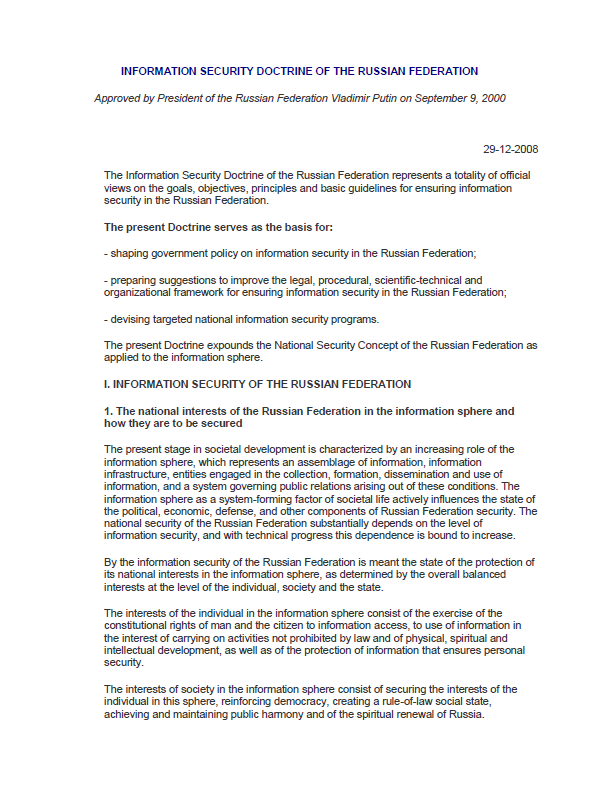The Information Security Doctrine of the Russian Federation represents a totality of official views on the goals, objectives, principles and basic guidelines for ensuring information security in the Russian Federation.
The present Doctrine serves as the basis for:
– shaping government policy on information security in the Russian Federation;
– preparing suggestions to improve the legal, procedural, scientific-technical and organizational framework for ensuring information security in the Russian Federation;
– devising targeted national information security programs. The present Doctrine expounds the National Security Concept of the Russian Federation as applied to the information sphere.
…
2. Types of threats to the information security of the Russian Federation
According to their general directionality, threats to the information security of the Russian Federation are subdivided into the following types:
– threats to the constitutional rights and freedoms of man and the citizen in the area of spiritual life and information activities, to individual, group and public consciousness and to Russia’s spiritual revival;
– threats to information support to Russian Federation state policy;
– threats to Russian information industry (including informatization, telecommunication, and communication facilities) development, to the satisfaction of domestic market requirements with its products and their entry into the world market, and to the accumulation, storage reliability, and effective utilization of national information resources;
– threats to the security of information and telecommunication systems and facilities whether already deployed or being set up on the territory of Russia.
The threats to the constitutional rights and freedoms of man and the citizen in the areas of spiritual life and information activities, to individual, group and public consciousness and to Russia’s spiritual revival may be as follows:
– adoption by federal bodies of state authority or by bodies of state authority in constituent entities of the Russian Federation of normative legal acts infringing the constitutional rights and freedoms of citizens in the areas of their spiritual life and information activities;
– establishment of monopolies on forming, receiving and disseminating information in the Russian Federation with the use of telecommunication systems or otherwise;
– counteraction, by criminal structures in particular, against citizens’ exercise of their constitutional rights to personal and family privacy and to the secrecy of postal mail, telephone and other communications; – irrational, excessive restrictions placed on access to socially necessary information;
– illegal use of special means of influence on individual, group and public consciousness;
– noncompliance by federal bodies of state authority, by bodies of state authority in constituent entities of the Russian Federation, by bodies of local self-government or by organizations and citizens with the requirements of the federal legislation governing relations in the information sphere;
– unlawful restrictions on access by citizens to open information resources of the federal bodies of state authority, the bodies of state authority of the constituent entities of the Russian Federation or bodies of local self-government, to open archival materials and to other open socially significant information;
– disorganization or destruction of a system of accumulation and preservation of cultural properties, including archives;
– violation of the constitutional rights and freedoms of man and the citizen in the field of mass information;
– ousting of Russian news agencies and media from the national information market, and an increase in dependence of the spiritual, economic and political areas of public life in Russia on foreign information entities;
– depreciation of spiritual values, the propaganda of specimens of mass culture based on the cult of violence or on spiritual and moral values contrary to the values adopted in Russian society;
– a decrease in the spiritual, moral and creative potential of the Russian population that would substantially complicate training manpower resources for adoption and use of newest (including information) technologies, – information manipulation (disinformation, information concealment and distortion).
…
In the foreign policy sphere – The most important Russian information security targets in the foreign policy sphere are:
– the information resources of the federal executive bodies implementing Russian Federation foreign policy, of the Russian representations and organizations abroad and the representations of the Russian Federation at international organizations;
– the information resources of the representations of the federal executive bodies implementing Russian Federation foreign policy on the territory of the constituent entities of the Russian Federation;
– the information resources of the Russian enterprises, institutions and organizations subordinate to the federal executive bodies implementing Russian Federation foreign policy;
– the blocking of the activities of Russian media in explaining to foreign audiences the goals and major thrust areas in the Russian Federation’s state policy and its view of socially significant events in Russian and international life.
Among external threats to Russian information security in the foreign policy sphere those representing the greatest danger are:
– informational influence that foreign political, economic, military and information entities may have on the elaboration and implementation of the foreign policy strategy of the Russian Federation;
– disinformation being spread overseas about the foreign policy of the Russian Federation;
– violation of the rights of Russian citizens and legal entities in the information sphere abroad;
– attempts at unsanctioned access to information or attack attempts against information resources and the information infrastructure of the federal executive bodies implementing Russian Federation foreign policy, of Russian representations and organizations abroad and the representations of the Russian Federation at international organizations.

